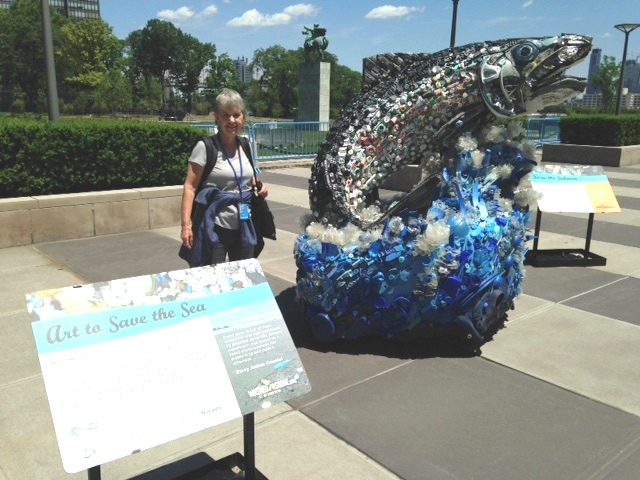Save our Oceans!
Save our Oceans - SDG 14: Life Below Water
by Jeanne Devine
We are all connected by oceans - they cover 75% of our earth’s
surface. Oceans are home to millions of
species of marine life, absorb 30% of human- produced carbon dioxide, provide
food and livelihoods to billions of people and are part of the complex system
that regulates climate and air. “The
oceans are part of us and we are part of the oceans,” John F. Kennedy.
June 5-9, 2017 was the UN International Conference of the Oceans in New York, the first-ever call for governments, non-governmental organizations (NGOs), philanthropic organizations, academia, private sector and local
communities to share knowledge, technology, and support for developing countries,
to mobilize urgent collective action to recover the health of the oceans by
2030. It is a game-changer for the world’s oceans and all 193 countries and NGOs are part of the
solution.
We don’t all live by oceans, but oceans are an integral part
of our lives. Air, water and
marine life do not have national borders.
Acidification results in bleaching of coral reefs – source of food for 25%
of marine species. We humans contribute to
high levels of plastics in the oceans which come from landfills and
agricultural runoff. Over-fishing
results in the loss of biodiversity and healthy fisheries are important for
global food security and employment. Small island states and coastal peoples
are threatened with loss of land and home.
Deep-sea mining for gold, zinc, iron, and other minerals must be
strictly regulated as they are resources of all people.
What can Servas members do?
As an NGO affiliated with the UN, and 15,000 members in 120 countries,
we can make a difference! When we travel or host friends, we can raise
awareness of oceans and promote healthy use of marine resources. We can stay informed and connected regarding
critical issues and advocate and share information about the world’s oceans. We can support ecotourism and sustainable
practices especially in coastal areas.
We can encourage our youth to get involved in local sustainable projects.
We can consume less, reuse, and recycle all plastic - go to cleanseas.org to see ways to reduce your
plastic footprint and we can stop using plastic bags. On
social media, go to #CleanSeas to
share a personal action to reduce plastic in oceans.
Photos: 6/9/17 of Washed Ashore, (Washedashore.org), a non-profit
community art project, which exhibited
sculptures at the UN of Stella the Seahorse, Nora
the Salmon, and Grace the Humpback made from pieces of plastic that were purchased, discarded, became waterborne, and landed on a
beach where someone else picked them up and made a difference. They were part of the UN Clean Seas
Campaign. Every Action counts!




Amazing art from recycled plastic! Smart! Thank you Jeanne for sharing!
ReplyDelete